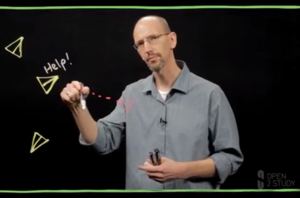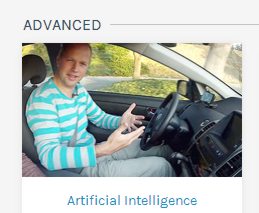| November Computing MOOC Picks |
| Written by Sue Gee |
| Thursday, 31 October 2013 |
|
After a couple of busy months for Computer Science related MOOCs, November sees fewer starts - something you may find a relief if you are already busy studying.There are, however, some intriguing options. If you are looking for something a bit different that uses computer science, take a look at the trailer for Bioinformatics (Part 1) which opens with Pavel Pevzner stating: "The goal of this class is to make you fall in love with bioinformatics"
Together with colleagues Phillip E. C. Compeau, and Nikolay Vyahhi from University of California, San Diego, Pavel Pevzner wants to lure students away from their existing disciplines to bioinformatics. Later in the introductory video he tells prospective students: This will be an unusual course, even by Coursera standards, because we have recruited top scientists to direct research projects for this course. In this sense this class is "not just a MOOC, but a MORP" (Massive Online Resarch Project) that uses the Bioinformatics Learning Platform Rosalind. A comment to the Your Tube video makes the point If the rest of the course is as good as this intro video this is going to be an amazing class. and it does seem as if a great deal of effort has gone into its preparation. It was originally scheduled to begin in October but its start was postponed so, although the course opens on November 4th, the first couple of lectures are already up and material is also available on Stepic, its online, interactive textbook that has homework problems and quiz exercises integrated into the text.. Bioinformatics Part 1 lasts 6 weeks with a further 6-week follow on scheduled for January and you can expect a workload of 8-10. Prerequisites are only that should know the basics of programming in any language that you choose - and Python is the language you'll be using. Also starting on November 4th on the Coursera platform is Automata taught by Stanford professor, Jeff Ullman. Over 6 weeks, with a workload of 10 hours per week it aims to cover four broad areas: (1) Finite automata and regular expressions, (2) Context-free grammars, (3) Turing machines and decidability, and (4) the theory of intractability, or NP-complete problems.
You should already have a grounding Computer Science by way of basic data structures (e.g., lists, trees, hashing), and basic algorithms (e.g., tree traversals, recursive programming, big-oh running time). You also need some discrete mathematics, i.e. propositional logic, graphs, and inductive proofs. The course includes two optional programming exercises for which a knowledge of Java or Python is required. There's still time to catch a class that started on October 28th. Neuronal Dynamics from edX is a 7-week course with a workload of 6 hours per week that gives an introduction to the field of theoretical and computational neuroscience with a focus on models of single neurons. Taught by Wulfram Gersner of Ecole Polytechnique Federalle de Lausanne it is about the brain and is where biology meets computer science and sounds as if it will give fascinating insights. Its prerequisites are calculus, differential equations and probabilities .
One class that also started on October 28th and was an obvious candidate for inclusion in this "Pick of the Month" is FutureLearn's Begin Programming: Build Your First Mobile Game, a seven-week course teaching the basics of Java in which students will build a game from scratch. However, as previously explained it is a fully subscribed, limited-place beta. It seems that its 1,000 places were taken with 24 hours of registration being opened - which just shows the pent-up demand for this type of course. If you want a taster of Game Programming, Open2Study's Concepts of Game Development, a 4-week course that has a workload of just a couple of hours per week starts again on November 18th.
If you are still looking for a course to occupy the winter evenings do remember that Udaciity's curriculum is entirely self-paced - which means you can start at any time and go at your own pace. This means you can embark today - or tomorrow ... - on Introduction to Computer Science, Intro to Programming in Java or, at a more advanced level, HTML5 Game Development, Intro to Theoretical Computer Science, Design of Computer Programs or Artificial Intelligence for Robotics.
And if you missed the MOOC that attracted record numbers of students two years ago and set the scene for the MOOC explosion there's a revised version of Sebastian Thrun and Peter Norvig's Introduction to Artificial Intelligence.
More Information
Related ArticlesBack To MOOC - September's Computer Science Courses Computer Science MOOC Round Up August Online Computer Science and July MOOCs June Computing MOOCs and Open Courses May Computing MOOCs and Open Courses April's Crop of Computer MOOCs A Dozen Free Online Computer Science Courses Peter Norvig On The 100,000-Student Classroom Stanford AI Class - Mid Term Report Sebastian Thrun Resigns from Stanford to Launch Udacity To be informed about new articles on I Programmer, install the I Programmer Toolbar, subscribe to the RSS feed, follow us on, Twitter, Facebook, Google+ or Linkedin, or sign up for our weekly newsletter.
{loadposition comment}
{loadposition moreNEWS} {loadposition moreNEWSlist} |
| Last Updated ( Thursday, 31 October 2013 ) |

